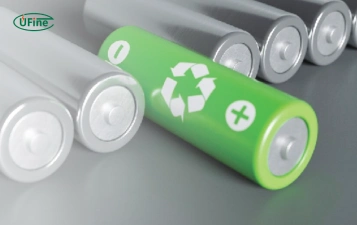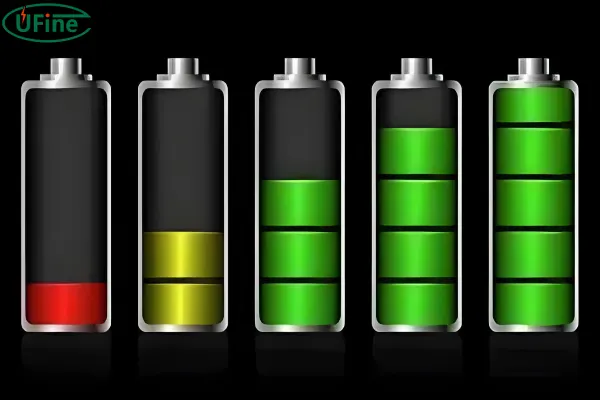
- Part 1. What happens if lithium batteries are not used for a long time?
- Part 2. Is it better to store batteries charged or uncharged?
- Part 3. How long can you store a lithium battery?
- Part 4. Is it bad to leave a lithium battery uncharged for a long time?
- Part 5. Do lithium batteries drain when not in use?
- Part 6. How to store not been used for a long time lithium batteries?
- Part 7. Do lithium batteries expire if not used
- Part 8. FAQs
Lithium batteries have become essential in our everyday devices, from smartphones to laptops to electric cars. But have you ever wondered what happens if these batteries sit unused for a long time? In this article, we’ll dive into the effects of leaving lithium batteries unused, the best practices for storing them, and tips to maintain their longevity. Let’s get started and make sure your lithium batteries stay in top shape!
Part 1. What happens if lithium batteries are not used for a long time?
When lithium batteries are left unused for extended periods, several things can occur.
Firstly, they experience self-discharge, which means they gradually lose their charge over time, even if they’re not powering a device. This self-discharge can lead to a completely drained battery if left unchecked.
Additionally, a passivation layer might form on the battery’s electrodes. This layer increases the battery’s internal resistance, which reduces its capacity and efficiency. Essentially, your battery won’t perform as well as it used to.
Let’s break it down further:
- Self-Discharge: Lithium batteries naturally lose their charge over time. This process is slow, but it’s inevitable. Even if you’re not using the battery, it will gradually discharge itself. If left unused for months, a fully charged lithium battery can become completely depleted.
- Capacity Loss: Over time, unused lithium batteries can lose their ability to hold a charge. This means that when you finally decide to use the battery, it might not last as long as it would have if it had been used regularly. The passivation layer that forms on the electrodes can contribute to this loss of capacity.
- Increased Internal Resistance: The passivation layer mentioned earlier also leads to increased internal resistance within the battery. Higher resistance means that the battery will not only have a reduced capacity but also might not be able to deliver power as efficiently as before.
Part 2. Is it better to store batteries charged or uncharged?
When it comes to storing lithium batteries, you might wonder whether it’s best to store them charged or uncharged. The general consensus among experts is to store lithium batteries at about 50% to 60% of their capacity. Storing them fully charged can put extra stress on the battery, while storing them completely discharged can cause them to enter a deep discharge state, which is harmful. Keeping them partially charged helps to maintain their overall health and prolong their lifespan.
1. Storing Fully Charged Batteries
While it might seem logical to store a fully charged battery, doing so can put unnecessary stress on the battery cells. High voltage can cause the battery to degrade faster, reducing its overall lifespan. If you plan to store your lithium batteries for an extended period, avoid charging them to 100%.
2. Storing Fully Discharged Batteries
On the other hand, storing batteries that are completely discharged can lead to a condition known as deep discharge. In this state, the battery’s voltage drops too low, making it difficult, if not impossible, to recharge. Deep discharge can cause permanent damage to the battery, reducing its capacity and overall lifespan.
3. Ideal Storage Level
The sweet spot for storing lithium batteries is at a partial charge, around 50-60%. This level helps to minimize stress on the battery cells while preventing deep discharge. It’s a balanced approach that ensures the battery remains in good condition during storage.
Part 3. How long can you store a lithium battery?
You might be curious about how long you can store a lithium battery before it starts to degrade. Generally, lithium batteries can be stored for up to 6 to 12 months without significant degradation, provided they are stored under the right conditions.
However, it’s a good idea to check on them every few months to ensure they’re still in good condition.
Here are some storage tips:
- Cool and Dry Place: Store batteries in a cool, dry place to prevent overheating and moisture damage.
- Avoid Direct Sunlight: Keep batteries away from direct sunlight to prevent them from getting too hot.
- Regular Checks: Every few months, check the battery’s charge level and recharge it to 50-60% if necessary.
Factors Affecting Storage Time
Several factors can influence how long you can store a lithium battery before it starts to degrade:
- Temperature: High temperatures can accelerate the degradation process. Ideally, store your batteries at a temperature between 20°C to 25°C (68°F to 77°F).
- Humidity: High humidity can cause corrosion and other damage to the battery. Keep your batteries in a dry environment.
- Battery Age: Newer batteries tend to have a longer shelf life compared to older ones. If you’re storing an older battery, it might degrade faster.
Part 4. Is it bad to leave a lithium battery uncharged for a long time?
Leaving a lithium battery completely uncharged for a long time can be detrimental.
If a lithium battery is left in a discharged state for too long, it can fall into a deep discharge state. In this state, the battery’s voltage drops too low, which can lead to irreversible damage and a significant reduction in capacity. To avoid this, always ensure that lithium batteries are stored with a partial charge.
Deep discharge can cause several issues:
- Permanent Capacity Loss: The battery’s ability to hold a charge can be permanently reduced.
- Increased Internal Resistance: This can lead to inefficiencies in power delivery.
- Safety Concerns: Deep discharge can sometimes lead to swelling or other physical damage to the battery, posing safety risks.
Part 5. Do lithium batteries drain when not in use?
Yes, lithium batteries do drain when not in use, thanks to self-discharge.
The rate of self-discharge depends on the battery’s quality, age, and storage conditions. On average, lithium batteries lose about 2-3% of their charge per month when stored properly. While this might not seem like much, it can add up over several months, potentially leaving the battery with little to no charge when you need it. Regularly checking and recharging the battery can help keep this issue in check.
Factors Affecting Self-Discharge
- Several factors can influence the rate of self-discharge:
- Battery Quality: High-quality batteries tend to have a lower self-discharge rate.
- Age of the Battery: Older batteries typically have a higher self-discharge rate compared to newer ones.
- Storage Conditions: Proper storage conditions (cool and dry) can help minimize the self-discharge rate.
Part 6. How to store not been used for a long time lithium batteries?
Proper storage is key to maintaining the health of your lithium batteries. Here are some tips for storing lithium batteries that won’t be used for a while:
- Partial Charge: Keep the batteries at about 50-60% of their charge to reduce stress and avoid deep discharge.
- Cool Environment: Store the batteries in a cool place to prevent overheating.
- Dry Location: Avoid humidity and moisture, which can damage the batteries.
- Protective Case: Use a protective case or container to prevent physical damage and short-circuiting.
- Periodic Checks: Check the batteries every few months and recharge them to the recommended storage level if needed.
Additional Storage Tips
- Label and Date: Label your batteries with the date they were stored to keep track of how long they’ve been in storage.
- Avoid Metal Contacts: Ensure that the battery terminals are not in contact with metal objects to prevent short-circuiting.
- Store Separately: If storing multiple batteries, keep them separate to avoid any potential contact that could cause damage.
Part 7. Do lithium batteries expire if not used
Yes, lithium batteries can degrade over time even if not used, though the rate depends on several factors.
Why Do Lithium Batteries Degrade When Unused?
-
Chemical Aging
-
Lithium-ion batteries slowly lose capacity due to internal chemical reactions, even when idle.
-
The electrolyte breaks down, and lithium ions form inactive compounds, reducing available charge.
-
-
Storage Voltage Matters
-
Storing a battery at 100% charge accelerates degradation.
-
Storing at 0% charge can lead to deep discharge, permanently damaging the battery.
-
Best practice: Store lithium batteries at 40-60% charge.
-
-
Temperature Effects
-
High temperatures (>25°C / 77°F) speed up chemical aging.
-
Very cold storage (<0°C / 32°F) can also harm some batteries.
-
Best practice: Store in a cool, dry place (~15°C / 59°F ideal).
-
How Long Do Unused Lithium Batteries Last?
-
General Lifespan:
-
2–3 years (even unused) before noticeable capacity loss.
-
After 5–10 years, many lithium batteries become unreliable.
-
-
Quality Matters:
-
High-quality cells (e.g., Panasonic, Samsung) degrade slower than cheap ones.
-
How to Extend Shelf Life
✔ Charge to ~50% before storage
✔ Store in a cool place (avoid cars, garages, or direct sunlight)
✔ Check every 6–12 months & recharge to 50% if voltage drops too low
✔ Avoid humidity (prevents corrosion)
Signs Your Lithium Battery Has Expired
-
Swelling or leakage
-
Much shorter runtime than before
-
Failure to hold a charge
-
Device not recognizing the battery
Part 8. FAQs
How long can you leave a lithium battery uncharged?
You can leave a lithium battery uncharged for about 3 to 6 months. However, it’s best to store it at around 40–60% charge and check it every few months to avoid deep discharge.
How long do lithium batteries last unopened?
Unopened lithium batteries typically last 2 to 10 years, depending on storage conditions. Cool, dry environments help preserve their shelf life.
Can a lithium battery be stored for a long period without being used?
Yes, but it should be stored at partial charge (40–60%) in a cool, dry place. Periodically check and recharge if needed to prevent degradation.
How long will a lithium battery hold a full charge?
A fully charged lithium battery can hold its charge for a few months, but it will slowly self-discharge. The rate depends on battery quality and storage conditions.
Do lithium batteries really last 10 years?
Some high-quality lithium batteries can last up to 10 years with proper care, but most consumer batteries last 3 to 7 years depending on usage and environment.
Related Tags:
More Articles

Lithium Battery Sizes Guide: 18650, 21700, LiPo & Coin
Learn about lithium battery sizes, form factors, and uses. Compare dimensions and capacities for cylindrical, pouch, prismatic, and more.
What’s the Difference Between Lithium Metal AA Battery and Lithium Ion Battery?
Learn the difference between lithium metal AA batteries and other types. Find out if AA batteries are lithium and which type performs best for your devices.
9v Lithium or Alkaline Battery: Which One’s More Reliable?
9v lithium vs alkaline battery: Which one packs more power? Learn the key differences and choose the right battery for your needs now.
What are Watts and Watt Hours in Battery?
Understand watt vs watt-hour in batteries, how to calculate battery watt hours, and what Wh means for car batteries, devices, and energy storage.
A Complete Guide to the Best Batteries for Flashlights
Compare the best batteries for flashlights, including AA, AAA, 18650, 21700, CR123A. See which battery offers the best brightness, runtime, and reliability.






